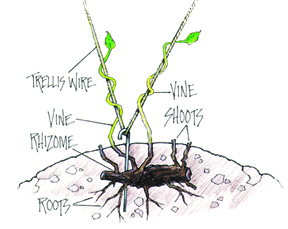Topic: Hops
Growing Hops
At your local homebrew supply store, the grains are probably stored in bins or barrels at room temperature. In contrast, the hops are — or should be — refrigerated. The hops are stored cold for a reason — because fresher hops taste better.
ID’ing wild hops
Hop variety identification can be done the old-fashioned way of comparing pictures of hop cones of known varieties to the unknown. Although this method is not perfect, it is widely used as
A Brewer’s Roundtable — The Pros Talk Shop About Hops
How can one little cone bring so much happiness? Professional brewers give their thoughts on hops and hoppy beers in our brewers’ roundtable. Pull up a seat and join the discussion.
Practical Approaches to Controlling Bitterness in Homebrews
Your brewing calculator says your beer will be 45.27 IBUs….but will it? How will you know? What you need to know to make sense of bitterness calculations and hit your target bitterness consistently.
Hop bags
My overall philosophy with brewing is extremely simple and goes something like this: “If the method works to produce good tasting beer with the desired aroma, stability, appearance and material yields —
Dry Hopping Techniques
Want more hop aroma in your beer? Then try dry hopping and transport yourself to hop heaven.
Using American Hops: Tips from the Pros
Uncle Sam wants you….to brew with Cascades, Centennial, Columbus, Crystal (and perhaps some other American hops that don’t begin with the letter “C”).
Hop to Style!
Cascade works well with a West Coast Pale Ale. Fuggle should finish an English bitter. Galena or Cluster go great with porter. Here’s a straightforward guide to picking the right hops for your favorite style of beer.
Storing hop pellets
This is a good question with a very straightforward answer — storing hops at freezer temperatures does extend their life and will not damage the hops. How can I be so definitive,
dry hopping vs using a hopback?
Most brewing techniques are touted by a long list of advantages. Dry-hopping, which means adding compressed hop cones or hop pellets to beer or fermenting beer, can be “sold” by its ability
Hop Chemistry Science
Understanding alpha acids, beta acids and beyond.
Fresh hopped beers
Fresh, unkilned hops can certainly be used in beer and there is no right or wrong way to use them. I think fresh or “green” hops are best for late-hopping because of



